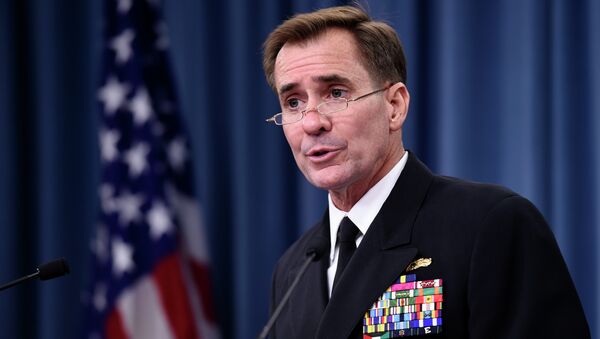ASHINGTON (Sputnik) — Iran and the P5+1 group of countries came to a final agreement on the parameters of Tehran’s nuclear program. Iran agreed to 15-year limits on its uranium enrichment and stockpiles, in addition to pledging not to build additional heavy water reactors or produce weapons grade plutonium. Tehran is also to be the subject to extensive IAEA monitoring for 25 years.
In exchange, the P5+1 group of countries — comprised of the United States, Russia, China, France and the United Kingdom plus Germany — will lift all nuclear, banking oil and gas sanctions imposed on Iran.
“There [are] no side deals… no secret deals between Iran and IAEA that the P5+1 has not been briefed on in detail,” Kirby stated on Wednesday.
Kirby added that US experts are aware and have no problem with the existing arrangements between Iran and IAEA.
“Our experts are familiar and comfortable with the content which we would be happy to discuss with Congress in a classified setting,” he noted.
Kirby’s statements come in response to the demands by US Senator Tom Cotton and Congressman Mike Pompeo for the Obama administration to fully disclose the arrangements between Iran and the IAEA as part of the Iran nuclear deal. The lawmakers claim that there are secret side deals between Tehran and the IAEA.
“Congress has what we have. What’s being asked for here are IAEA documents or material that is not in our possession,” Kirby asserted.
The State Department spokesperson also noted the technical arrangements of Iran with IAEA are a matter of standard practice, and are not released publicly or to other states.
“These are issues between Iran and IAEA. These technical agreements are never shared outside the state in question in the IAEA. But we have been briefed on them,” Kirby said.
On July 14, 2015, Iran’s Atomic Energy Organization and the IAEA signed a roadmap for the clarification of possible military aspects of Iran's past and present nuclear activities.
The agreement provides for “technical-expert meetings, technical measures, as agreed in a separate arrangement" as well as for discussions between Iran and the IAEA to address any ambiguities.
The roadmap mentions a separate as-yet-unpublished arrangement regarding Iran’s Parchin military site.
IAEA will be responsible to monitor and verify possible military dimensions within Tehran’s nuclear program, and will provide reports. In turn, Iran will adhere to the IAEA protocol granting the organization expanded rights to inspect Tehran’s nuclear facilities.

